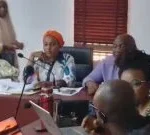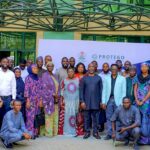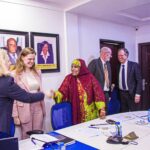By Gabriel Agbeja, News Agency of Nigeria (NAN)
At the 30th Conference of the Parties (COP30) to the United Nations Framework Convention on Climate Change (UNFCCC) being held from Nov.10 to Nov. 21 in Belem, Brazil, Africa stands at a crossroad.
The conference, in the face of a changing global landscape, presents a unique opportunity for African nations to articulate their needs and aspirations in the fight against climate change.
With the continent among the hardest hit by environmental crises, its stance at COP30 is not merely a matter of policy but a fight for survival and sustainable development.
The Head of UNFCCC, Mr Simon Stiell, warned in a recent forum that developing nations remained dangerously short of the resources needed to withstand worsening storms, flood and droughts.
Stiell called for finance to “flow right now“as delegates prepared for COP 30, seen as a crunch summit for turning promises into action.
“Extreme weather events such as devastating wildfires, catastrophic droughts, and apocalyptic floods are making life increasingly difficult in all parts of the world.
“There are plenty of examples of effective measures that countries can take to adapt to this new normal, ranging from high sea walls to cyclone warning system, floating homes and planting drought-tolerant crops,” he said.
In the same vein, Vice-President Kashim Shettima said a reliable and equitable architecture that recognised the realities of developing nations and empowered them to deliver on global commitment was needed.
Shettima, who rallied global leaders at opening of the Heads of State Summit at the COP30, pointed out that no nation could finance climate ambition with goodwill alone.
“I hereby say with absolute certainty that we are not the problem; we are an integral part of the solution.
“This is why, at COP30, we hope to demonstrate that Africa can lead in carbon capture through forests, in renewable energy expansion, and in regional cooperation that translates ambition into prosperity,’’ he said.
Some of the African delegates who spoke with the News Agency of Nigerian (NAN) expressed optimism that the outcomes of the event would reposition African continent.
Mr Tamba Nyaka, the Director of Climate Change, Sierra Leone, said that the outcome of COP30 would further address impacts of climate change on Africa.
He added that his country had been engaging in several adaptable measures to mitigate climate change.
According to him, COP30 promises a platform for negotiations on critical issues, including emissions reduction, financing for climate adaptation, and equitable resource distribution.
“For Africa, which bears only a fraction of global carbon emissions but suffers disproportionately from climate impacts—such as droughts, floods, and rising temperatures—this conference is crucial.
“With the reality of climate change increasingly evident, the continent seeks not just recognition but substantial commitments from developed nations,’’ he said.
Moreover, Mr Francis Opolot, an official of the Ministry of Water and Environment, Uganda, said that Africa was ready to fully sell her story in the coming COP 30 for proper consideration.
According to him, one of Africa’s primary demands is increased access to climate finance.
“The continent needs substantial investments for adaptation and mitigation efforts, which are essential for building resilient infrastructure and sustainable agricultural practices.
“At COP30, African nations will push for the fulfilment of past pledges made by developed countries to mobilise 100billion dollars annually for climate action.
“Also, advocating for innovative finance mechanisms, such as debt relief in exchange for climate action, to allow the continent to redirect funds toward sustainable development,’’ he said.
Meanwhile, Mr Tewaney Seifesellassie, Senior Climate Advisor of the Ethiopian Orthodox Church, told NAN that Africa stood to be favourably considered during the negotiations and decisions making at COP30.
According to him, the developed countries are more convinced that assisting Africa to mitigate climate change is as well for their good.
“Africa is at the frontline of climate-induced disasters.
“The establishment of a loss and damage fund meant for compensating nations for irreparable damage due to climate change will be a focal point for African negotiators.
“By emphasising the importance of addressing loss and damage, African nations aim to secure international recognition of their plight and the need for reparative justice.
“While many African countries are rich in renewable energy resources such as solar and wind, transitioning from fossil fuels is essential yet challenging.
“COP30 is an opportunity for African nations to highlight the need for a just transition that considers their economic realities.
“They seek partnerships to develop renewable energy without compromising energy access and development goals for their populations.
According to him, Africa is home to diverse ecosystems that are critical for global biodiversity and climate regulation.
Seifesellassie said delegates from the Africa continent would advocate for the protection and restoration of the ecosystems.
He argued that preserving biodiversity was not only a local priority but also a global imperative.
The senior climate advisor added that African delegates would push for commitments to protect rainforests, savannas, and wetlands, which were vital to both climate stability and livelihoods.
“Recognising that climate action must be inclusive, Africa will focus on integrating the voices of youth and local communities into COP30 discussions.
“Young activists from across the continent are expected to mobilise, advocating for their future and calling for actionable commitments from leaders.
“Local communities, who are often the first responders to climate impacts, will also be represented, emphasising traditional knowledge and practices in climate resilience strategies.”
According to him, Africa’s stance at COP30 is not just about immediate gains; it is about shaping the future of the continent in an era of climate uncertainty.
“By standing united, African nations aim to leverage their collective bargaining power, not only to address climate change but to pursue development goals that can uplift millions out of poverty.
“Furthermore, the outcomes of COP30 could set a precedent for future climate negotiations, influencing the global response to climate change for decades to come.
“A successful conference for Africa could inspire similar movements in other vulnerable regions, fostering a global coalition aimed at equitable and sustainable climate action,’’ he said.
As COP30 unfolds, all eyes will be on Africa; the continent’s stance is rooted in urgency and resilience—a demand for justice, support, and recognition that cannot be overlooked.
Climate change advocates say the world must listen to Africa’s voice, as its future hinges on the commitments made at this pivotal conference.
With strong advocacy and solidarity, stakeholders believe Africa can emerge not just as a victim of climate change but as a leader in the quest for a sustainable and equitable future.(NANFeatures)
***If used, please credit the writer and the News Agency of Nigeria.












